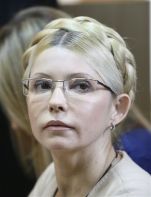• Topics / Politics and human rights
• Topics / The right to a fair trial
Swift and coordinated – next Tymoshenko verdict not far off

Given the lightening speed and coordination of the actions of the government, Prosecutor’s office and courts, another sentence against former Prime Minister Yulia Tymoshenko can, it would seem, be expected before her case is examined in the European Court of Human Rights.
On 28 March the time allocated by the Kyivsky District Court in Kharkiv for Tymoshenko and her defence to read the material of the criminal file against her over the United Energy Systems of Ukraine [UESU] Cooperation. The Security Service [SBU] reports that the case accusing the former Prime Minister is to be sent to the Kharkiv Regional Prosecutor for approval and then to the court.
The SBU claims that “Tymoshenko’s unlawful acts” cost the state “several tens of millions of hryvnya”. She is charged with “organizing the appropriation and attempting to appropriate property that did not belong to her (state funds) via abuse of office and official forgery, tax evasion by the UESU Corporation, which resulted in the State budget loosing money”.
Serhiy Vlasenko, MP and Yulia Tymoshenko’s defence lawyer is convinced that the four episodes which Ms Tymoshenko is charged over have little justification in being termed crimes.
He says, for example, that the alleged attempted appropriation of public funds refers to an UESU declaration seeming VAT compensation from 13 years ago, rejected by the tax inspectorate. He says that Ms Tymoshenko had already been an MP for two years at that time and held no position in the corporation.
He complains that they were only given a few weeks to read the material though this comes to thousands of pages in 25 volumes. He believes that such haste is to ensure another conviction before Ms Tymoshenko’s case is examined by the European Court of Human Rights. “So as not to release Tymoshenko from prison, new criminal prosecutions are being thought up”.
Kyiv political analyst Viktor Nebozhenko says that the prosecutions of Tymoshenko and other members of the opposition suggest a return of the repression seen under Leonid Kuchma. If at that time they used administrative resource and pressure on the Prosecutor and court, now they’re resorting to raider practice. “Members of the regime, the law enforcement structures and criminal groups gather and clearly mark out the aim, tasks, financing and terms for each party’s roles. That’s why the Prosecutor acts so fast and the courts, while the media very promptly and in popular manner explain to the public what danger those accused present”.
Another feature of this is the lack of publicity, with the public only received information about the result, and then the victim is finally discredited by state media and those private media sources close to the regime.
On 20 October last year immediately after Tymoshenko’;s sentencing in the “gas case”, Prosecutor General Pshonka cancelled the decisions of his predecessor at the beginning of 2005 which terminated the criminal investigations against Yulia Tymoshenko. He claimed that they had been terminated illegally. By 28 October the Shevchenkivsky District Court had allowed the Prosecutor General’s Office to appeal against the termination (years earlier – translator) of criminal proceedings against Ms Tymoshenko’s father-in-law and others.
Within three days a cassation appeal was sent to the relevant High Specialized Court, and on 3 November, i.e. within 2 days, the Shevchenkivsky District Court had managed to prepare and provide the High Specialized Court with the material of the criminal investigation terminated in 2005.
The High Specialized Court was equally swift and on 17 November decided to terminate the cases not due to the lack of elements of a crime which would have effectively served as exoneration of Tymoshenko and UESU, but due to a time bar.
Abridged from the article at http://dw.de/dw/article/0, , 15845502, 00.html





